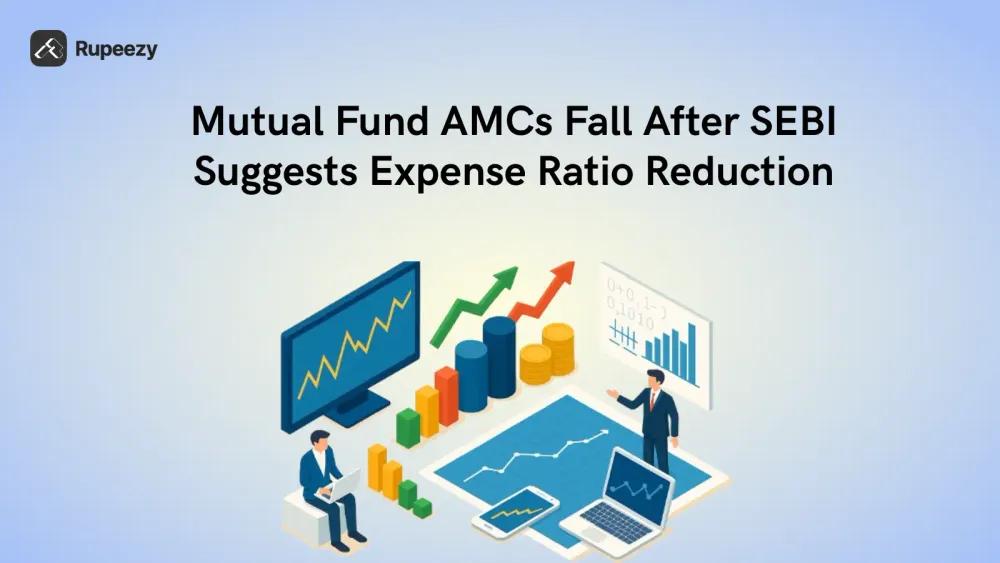Mutual Fund AMCs Fall After SEBI Suggests Expense Ratio Reduction


00:00 / 00:00
On Wednesday, the Indian AMC stocks saw a sharp fall after SEBI released its consultation paper on mutual funds on October 28, 2025, introducing several proposals that aim to overhaul expense structures, promote transparency, and reduce investor costs. The new regulatory framework, if implemented, can pose significant risks to the profitability of listed asset management companies (AMCs) and institutional brokers.
Market Reaction
On the day following the release of the SEBI consultation paper, shares of major listed AMCs such as HDFC AMC and Nippon Life India AMC declined notably, with HDFC AMC dropping up to 6.3% and Nippon dropping 6.7%. The sector-wide slide reflected analyst concerns that the SEBI proposals could materially compress industry earnings.
Key Proposals in SEBI’s Consultation Paper
SEBI’s consultation paper introduces several sweeping changes to mutual fund regulations, targeting greater transparency and reduced costs for investors:
Brokerage Fee Cap: SEBI has proposed capping brokerage fees for cash market trades at 2 basis points (down from 12 bps), and derivative trades at 1 basis point (down from 5 bps). This directly squeezes a funding channel for AMCs and institutional brokers, aiming to prevent investors from double-paying for research and execution.
Removal of Additional Expense Charge: The paper seeks to eliminate the 5 bps additional expense that fund houses could earlier levy across schemes, which was originally meant to compensate during the exit load transition.
Transparent Expense Disclosure: Statutory charges like STT, GST, and stamp duty will be excluded from the expense ratio cap and clearly shown as separate charges to investors. This makes the quoted TER more reflective of the fund manager’s actual fee rather than being padded by statutory or regulatory levies.
Performance-Linked TER: SEBI is considering an optional framework that allows AMCs to charge higher or lower fees based on actual fund performance, potentially increasing competition between fund houses.
NFO Expenses: All expenses for New Fund Offers (NFOs), up to the point of unit allotment, must be borne by the AMC, not the investor or the scheme.
Earnings and Business Implications
Brokerage reports, including Jefferies, flagged the consultation paper as a substantial risk for industry profitability, pegging a potential 8% to 10% drop if the proposals are enacted as mentioned. The steepest earnings impact is expected from the cut in equity exit loads and lower brokerage allowances, as per sources.
While changes such as the separation of statutory charges from TER caps are seen as relatively neutral to AMC bottom lines since these now simply pass through to end-investors, the curtailment of other eligible expenses, commissions, and brokerage fees only tightens bottom lines further.
Institutional brokers like 360 ONE WAM and Nuvama Wealth Management are also expected to feel the pinch as their mutual fund order volumes and permissible commissions can narrow.
Broader Industry and Investor Impact
For investors, the moves mark a decisive step toward lower costs, clearer disclosures, and greater value alignment, with direct benefit from economies of scale and competitive fund management. The industry, however, faces a profit squeeze and will need to recalibrate business models, especially those dependent on high-commission schemes and ancillary transaction revenues.
The proposed optional performance-based TER may catalyze a shift toward alpha-driven active management, pressuring laggard AMCs and incentivizing sustained outperformance.
Outlook
The proposals remain open for public comment until November 17, 2025, and industry stakeholders are seeking clarifications or moderation. The final framework could decide the balance between investor protection, industry profitability, and competitive market evolution in India’s Rs 77.78 lakh crore mutual fund sector as of September 2025.
The content on this blog is for educational purposes only and should not be considered investment advice. While we strive for accuracy, some information may contain errors or delays in updates.
Mentions of stocks or investment products are solely for informational purposes and do not constitute recommendations. Investors should conduct their own research before making any decisions.
Investing in financial markets are subject to market risks, and past performance does not guarantee future results. It is advisable to consult a qualified financial professional, review official documents, and verify information independently before making investment decisions.

All Category






